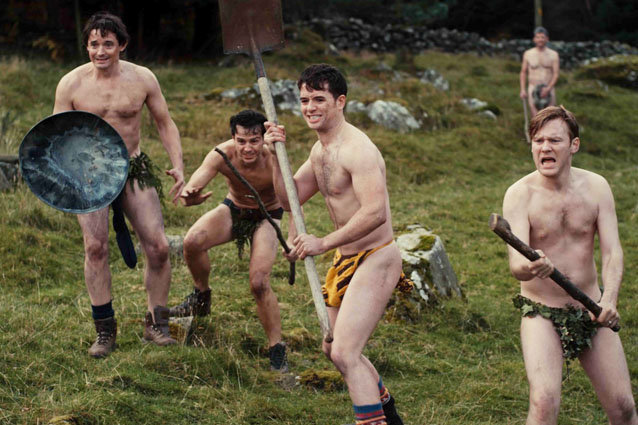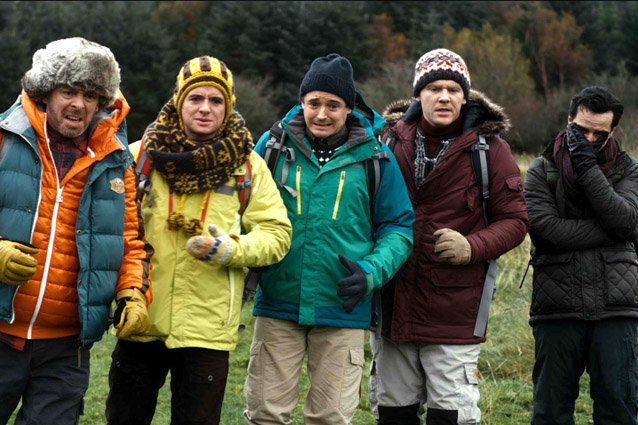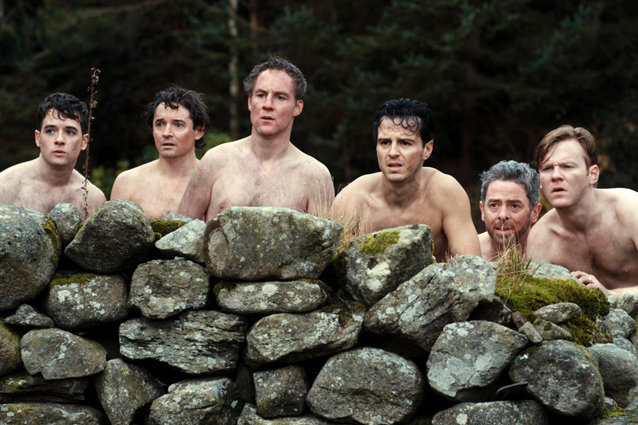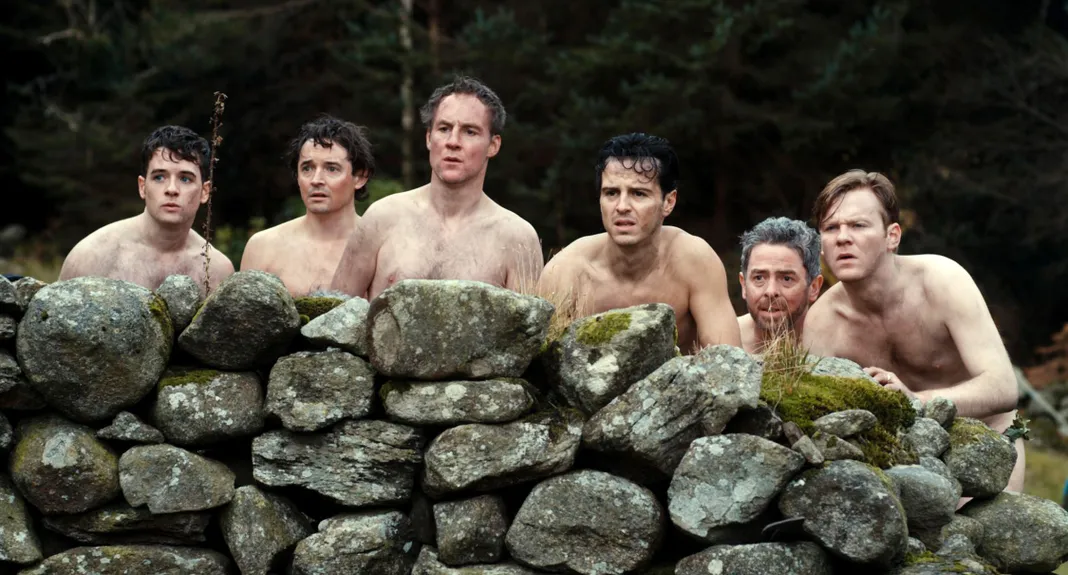 Tribeca Film
Tribeca Film
One of Tribeca Film Festival 2014’s more lighthearted pieces is The Bachelor Weekend — titled The Stag in Ireland, its country of origin — a comedy about a collection of “modern men” who take to the countryside for the main character Finoon’s (Hugh O’Conor) bachelor party, only to clash with an unwanted tag-along oozing alpha male bravado: Finoon’s future brother-in-law, known only as “the Machine” (Peter McDonald, who also co-wrote the film).
Whereas many a comedy film in the “one last hoorah” genre would go for big, broad laughs and wacky antics at the expense of the plot and characters, director John Butler’s Bachelor Weekend instead uses its fun premise to explore the nature of the folks at the center — a collection of guys that Butler and McDonald affirm are based on their friends. This kind of friendship is vivid from the way that they and O’Conor all riff on one another, managing to cover situations as grave as the evolution of masculinity over the course of the last 50 years and the national psyche of present day Ireland all the while cracking a few jokes about O’Conor jumping out a window.
My chat with Butler, McDonald, and O’Conor does contain a few major spoilers for The Bachelor Weekend, so be warned. But those who have seen the film, and who are hankering for a quick insight into the human ego, that breed of really bad bachlor parties, and director Butler’s mid-morning hallucinations, enjoy.
We’ve got a whole line of bachelor party movies in America — I’m sure you guys have seen plenty of them. A lot of them are very funny, but I was pleasantly surprised by how different Bachelor Weekend is in a lot of ways. Were you trying to bring something new to the genre specifically?
John Butler: Definitely. We like those films. Some of them are fantastic. One of the things that we thought we might like to try with our film was to create a real investment in the heart of the story, so that you really care for the characters and the emotional arc wasn’t tacked on to serve the jokes. We wanted to write it inside out so that you really felt for these people, while also serving up to jokes that worked. So that was important to us, I think. A comedy film with heart. The films that we might have mentioned in relation to that in the course of writing it would be things like Sideways, or…
Peter McDonald: Diner.
JB: … Diner, or Swingers. You know, films that don’t shortchange you emotionally but still serve up good jokes. So that was part of the inspiration.
PM: It was kind of sitting there waiting for someone to make it. So many films around the event of the wedding have been made. If not the wedding itself, it’s the bridesmaids, or the guys, or whatever. And we love those films, they’re really funny. And they are bigger films. So in that marketplace, it’s a comedy film, [snaps] we need 20 gags, so that’s what they’re going to make. So that’s totally understandable. But so many people go on stags! This is something that they can relate to, so why not have a film that has the comedy but also has the investment in the characters?
JB: We don’t know any of those “bros” that go on and devour stag weekends. That’s not really a familiar type to us. It’s more interesting to write about real guys who go on stags for reasons out of their control. Pushed out of their comfort zones. Not the guys who really love it, the kind of spring breaky types.
PM: Lots of guys go on stags just because that’s what you do. It’s just a ritual that everyone engages in. So [we wanted] to have a look at what place that ritual has in relation to guys and masculinity. Because The Machine is so different from the other guys, that no-man’s-land there is an interesting area.
JB: You show up on those stags, you’re not going to want to be drinking Jäger bombs with 20 strange men in four hours’ time. It’s such a surreal…
Hugh O’Conor: When you go to the West of Ireland a bit, it’s always that kind of — which is lovely! — but you’re away from what you’re used to…
PM: You get up the morning after the first night, and you’re like, “I have to hang out with these guys again?”
JB: And I have to drink!
HO: Yeah, the drinking…
PM: Then you show up to the wedding, and you’re like, “You’re such a tool. I’ve experienced you, and you’re the worst person.”
You’ve seen their true colors.
[Everybody “yeah”s]
JB: Have you been on many stags?
No, I’m going on my first one in a couple of weeks, actually.
JB: What’s the deal? What’s the setup?
It’s a high school friend of mine. These guys are probably more along the lines of the Machine than the other guys.
PM: Hookers and blow.
[Everybody laughs]
I’m more of a Finoon, so I’ll be reading in the back room.
JB: Team Finoon!
[More laughter]
Yeah, we’re going down to the Dominican Republic.
JB: Oh nice!
PM: All right! DR! That sounds like fun.
Yeah. I’m sure it will be.
PM: That sounds a lot more fun.
HO: That actually sounds good!
PM: I’ve got to say, though, I’ve had some killer times on stags.
Oh yeah?
PM: Absolutely. I’ve had some really great times with my best friends on their stags.
HO: Not yours.
[Laughter]
PM: So I think it’s also a celebration of that. And, if anything, [the movie] says stags are a good idea because they all get something out of the weekend. That’s the genre it’s in. It’s not going to have a downbeat ending, this story.
HO: There is that line you have in the scene with the campfire where you say, “You couldn’t put a price on this.” And you kind of go, “Wow, they did get there.”
PM: They did get there!
HO: It’s nice that they got there. Despite everything.
[“Yeah”s all around]
JB: Every experience, obviously, has value. It’s just that sometimes they’re set up the wrong way. You know what I mean? Sometimes the approach is wrong. Definitely it’s great going away with some friends. There can be great stuff in it. But the bad ones are bad…
 Tribeca Film
Tribeca Film
I like that you bring up masculinity. It’s a very clear theme in this movie. You have the wedding planner in the movie challenging Finoon’s masculinity, then the idea of his father disapproving of Finoon’s brother Kevin and his boyfriend [played by Michael Legge and Andrew Bennett, respectively]. Did you approach this movie wanting to discuss masculinity, or did it come about organically?
JB: We wanted to write about people that we knew, so it started with the characters. And then, obviously, the themes start to emerge from that. In our case, if we started to write about the men that we know, and put them in the context of the story, those themes start to emerge. Because what the masculine ideal these days?
Certain traits that we might consider, traditionally, to be feminine — being in touch with your emotions, and crying — that’s a form of strength! And that’s something, maybe, that modern masculinity is supposed to embody. So yeah, it was fun to play around with that stuff, but we always approached it from the point of view of the characters.
[Peter receives a glass of milk]
PM: Kumbaya!
JB: We need milk and cookies every half an hour.
PM: I’m a cookie monster! Milk, cookies…
JB: [Pointing to the corner of the room] Did you see something move there?
I don’t think so.
JB: I saw something move there, I thought I saw something move there…
PM: John drinks a lot of alcohol.
[Laughter]
PM: By this time of the morning, he will start to see things.
JB: I genuinely thought I saw something move out of the corner of my eye. I just realized…
PM: He’s got the heebie-jeebies!
[Laughter continues]
PM: … and an epic hangover.
JB: But no, we definitely don’t go, “What’s the theme?” and then try and write a film. It’s, “Who are the people?” And then we take it from there.
PM: Yeah. And there’s something about [the question], “What is it to be a man?” Any rational person knows — especially now, seeing the changes in the last 50 years for masculinity and men — that question has no meaning whatsoever. It’s always changing. But it’s interesting when you have such changes in masculinity over the last 50 years but, yet, our idea of what it meant to be a man in the ‘50s and ‘60s is still present to us in our generation
So when you have a bunch of modern men engaging in a ritual that they’re very halfhearted about, and on that ritual a guy turns up who is like, “I’m a f**kin’ man!” Like, “I know exactly that I’m…” It’s not even a question for him. He’s so the opposite to them. And he’s almost oblivious to how awkward he can be. He’s just one of those people. So it busts it open for the other guys in terms of their identity.
They’re guys who, in their initial exchange with The Machine, if they were to rewind and replay it, they’d just go, “Look… whatever your real name is. This isn’t gonna happen!” Do you know what I mean? But we know that when you’re with somebody that’s that intense you don’t say the things that you actually want to say. You’re kind of like, “I… I guess… yeah… okay, I’ll have another drink.” Do you know what I mean?
You’re ripped out of your element.
PM: You’re ripped out of your own thing! And the one thing he does immediately when he arrives on the scene, he totally splits them as a group. They’re immediately infighting and backstabbing each other, and saying, “I’m going to go home,” and blah blah blah. It’s the cat amongst the pigeons of masculinity. But we didn’t know that that’s what we were sitting down to write. It was only as we explored the characters…
HO: I suppose, as well, that you can still be a more modern man, like our characters are — me, [Andrew Scott’s character] Davin — you can be more in touch with your feelings and be open and talk about things and still be really stupid about stuff.
JB: Oh God yes!
HO: It doesn’t mean that just because you’re in touch with your feelings that everything is okay. I think that was kind of fun to play. Me and Davin both have loads of issues, still. Even though we’re both comfortable, in touch with stuff, we’re still idiots about a lot of things. Which is exactly like real life.
PM: And that, really, is the arc of the story — that these two modern men are engaged in a locking of horns. The same as two old school guys would be doing, in a very different way. But their cultural competitiveness is playing out a deeper unspoken argument. Their words and irony are their weapons.
HO: Yeah.
PM: And the deeper they go into the woods, the more they’re stripped of all their accoutrements. The more pared back the music gets, and the more naked they get, the less value their words have to them. They can’t protect themselves anymore.
HO: Your contact lens falls out!
PM: This guy needs to punch Davin. That’s what needs to happen in the story. That’s when he becomes connected to exactly how he feels.
JB: And Davin, most importantly, needs to tell him that he was so cut up at the time when [he and Ruth, Finoon’s fiancée, played by Amy Huberman] broke up, he felt so vulnerable that the last person he could turn to was his best friend.
PM: Sometimes you don’t turn to the people who are closest to you in those situations, because it reflects you so nakedly.
[Hugh feigns crying, the other two laugh]
JB: That window is shut!
HO: It can be opened!
JB: We just look over and Hugh’s gone.
[Laughter continues]
JB: All we see is that lavenir jacket just kind of fluttering…
PM: Fluttering in the wind! And we hear from the street, very distantly, “Oh my God!”
JB: It’s Finoon!
PM: It’s Finoon!
JB: Can he fly? No.
That’s all in the sequel.
[“Yeah”s all around]

But that actually reminds me — even though there’s a lot of comedy in this movie, it doesn’t get as broad, even in its funnier moments, than a lot of other comedies in this genre. When you guys destroy the memorial, no policemen come and throw you in jail. Or when you take MDMA, you go for a little run, but nobody freaks out and jumps off a bridge or anything like that. I guess I was wondering if there was a specific drive to keep the comedy grounded, or if this is just the style of humor that you guys find funny?
JB: I think that’s a conscious instinct. Particularly in terms of direction, that’s a very conscious decision. At the writing stage, it’s very conscious, too — you have to root the story, and once you commit to that, you have to sacrifice the idea of a sufficiently bigger joke that might derail the tone of the film.
But then when you direct the film you have to police that tone, too. Make sure it’s rooted. There is a kind of world you have to create that’s consistent. I think when you try to write characters inside out in that way, that’s always what you’re going to end up with. The films that we love that we mentioned before, the comedy films that work best are the ones that have a consistent tone. Yeah, that’s definitely the approach.
PM: And also, the overriding policy all the way through is character development. What’s going to happen to these guys? What is going to happen to their relationships? That’s what the audience should be invested in. If you invest the audience in the fact that they’re going to have a laugh every three minutes, like a big laugh, and then you stop doing that, they’re going, “You started off as one film, and then you’re becoming another.”
Whereas you have to do that slowly with a film like this. So you get into a place where there aren’t any laughs for like five minutes, 10 minutes, in this film at one stage. Well, maybe five minutes, whatever. For that to work, the audience has to be… you have to hook them in on the character development. If you put in gags that step outside of the character development, you might get a laugh out of them, but there’s no going back. You’ve already cheated the reality of the world that John is creating as a director.
JB: And it’s an American common tradition that we’re working in. That’s the thing that we totally respect and acknowledge as people who watch films. Since it’s an American tradition, the best comedy films come from that tradition.
PM: Yeah, yeah.
JB: Those are the rules of the genre. I think if there’s any little reinvention or anything that’s going on in our film, I think it’s subtle.
PM: I think there are English examples, like Withnail [and I], which is such a brilliant film. There are films like that in the British comedy tradition as well. And that is a shining example of British comedy at work, because it’s such a funny film but it’s about two guys going to a cottage in the middle of nowhere. Two actors who are broke, going to a cottage and having an encounter with the gay uncle. And it’s all dialogue-driven.
But the whole thing about that film is that you get so invested in their relationship and their friendship that the end of the film is actually a very downbeat ending because it’s so sad. [Bruce Robinson] is a great writer. It’s a pity he hasn’t made more films in the last few years. But you can just tell when there’s a gag there that’s there for getting a gag.
HO: We had some in there.
PM: We did. We got rid of them. And also, when you’re working with good actors, right off the bat they’ll go, “Why is he doing this?” if that’s happening. Do you know what I mean? If they’re being rigorous in how they’re approaching the part…
HO: I said that a lot. “Why is this happening?”
[Laughter]
I did want to ask you, Hugh, about that. Finoon is a tricky character. He’s a very serious person, but he’s a funny character. I would like to hear about making this serious, straight-laced guy fun to watch.
HO: Obviously, the guys had thought about it a lot beforehand, so they knew what to do with it. Like I said before, I was pretty much just being myself. [Laughs] And let that ridiculousness come through. I could sort of see his points on all sides. I think you can never really judge… if you start judging the character you’re playing, it’s a really bad thing. You have to just go with what he’s experiencing.
I think he’s right about everything. If you don’t control the flowers… I can’t trust [the wedding planner]. What has she done before, exactly? Give me a list! This is important to me. This is how it works. I’m stupidly anal about things like that myself. In terms of what you’re interested, in you’re really controlling. So he needs to get out of that a bit.
PM: That’s so true. Finoon and all the characters are written from a place of absolute empathy. We’re on the ground floor with them. There’s no standing in judgment over them. They’re us.
Probably the only part where there’s any judgment cast is when Brian Gleeson’s character Simon admits he doesn’t like U2.
JB: Yes!
You get the feeling you’re saying, “Well, you should like U2!”
[Laughter]
PM: But loads of Irish guys don’t like U2.
Oh of course.
JB: But he cries at the end [during “One Love”].
PM: So he’s a liar!
[Laughter continues]
Speaking of that, there are a lot of specific references to Ireland and Irish pride, mostly from the Machine. Were those just sort of ways to play with the character, or does this movie say something specific about Irish culture?
JB: I think the idea in place, that’s the Machine’s expression of his national pride rather than our expression of our national pride. It all emerges through these characters. The Machine makes the decision to make that speech about the state of the nation, and to sing that song. He’s the kind of person who — Peter could probably say this better than me — if he’s given the mic at a wedding, he’s not going to not do that. And that’s a decision that the character makes. And you’re just holding the pen. That’s what he does.
PM: The thing about the Machine, and we said this very early on when we started writing the film, is that he has absolutely no ego. [The others] are all totally weighed down by their egos. And that’s why there has been such a problem in their friendship, because they haven’t been able to be honest with each other.
An ego in that… I’m saying something to you right now and I’ll be editing it. Sometimes you might edit: “Well, I can’t say that. He might think that I’m a bit of a dick if I say that.” Whatever. You’re protecting people’s perception of you. That’s ego. The Machine, he’s just one of those people where that doesn’t even enter into his head. He’s just raw product all the time. And it’s just coming out.
The thing about that character is, while he’s incredibly overbearing, and very funny to start with — actually, when he arrives in the film, he’s a total nightmare — but it’s so liberating to be like that as a person. Because you’re not going around going, “Did he think when I said that…” or “Maybe I shouldn’t have…” He’s just moving forward in life all the time. So at the end, when he expresses national pride, it’s totally uncomplicated for him.
And his view of Ireland is that the thing that matters in a country, which is probably what we all feel, is the people. And that’s obviously a very democratic notion, and all that. But because — and I can only speak for myself here — we had a lot of economic troubles recently, like a lot of the world. America is going through terrible problems at the moment. But for a small country like Ireland that doesn’t have great natural resources, our greatest product or resource is the people of the country. I think there’s a little bit of that in there, as well.
JB: A young country as well. A hundred years old.
PM: Yeah, yeah. I mean, it’s an ancient culture, but as a democratic state it’s a very young country. We’ve only had the reins for a hundred years. And I think because of all of our history being colonized, the power the church had — all those kinds of things — pride and shame are two of the strongest ingredients in our national psyche. But they can be very divisive.
JB: We’re proud of ourselves and we’re ashamed of Hugh.
PM: Exactly. We’re proud of ourselves, but then we almost don’t want each other to succeed.
HO: [John] keeps staring at me.
PM: But it’s so liberating for a character like the Machine. That’s irrelevant to him. It’s just a positive message that comes out of him. And it’s not weighed down by those larger psychological chains that we wear in general. Over the last hundred years. So that was unconscious on our part, but I only say that looking back on the film. Does that make sense?
HO: You’re going to have an essay.
PM: Yeah! I’ve just given you a big hunk of bulls**t.
[Laughter]
PM: And also, it’s the Machine. It’s a character talking.
Well, I got the wrap up signal…
JB: Did you? That s**t is subtle!
…so the final question I need to ask is: Do you guys have an idea of why he is called the Machine?
JB: Yes.
But you won’t tell me, I take it.
PM: It’s up to the viewer.
JB: It goes to the grave.
PM: Yeah, it goes to the grave. Absolutely.
The Bachelor Weekend is available on Demand now.


